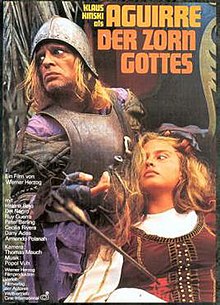Arguably one of German director Werner Herzog’s two or three greatest films, Aguirre, the Wrath of God is a visionary work, a serious exploration of obsession and descent into madness.
The film was one of the highlights of the New German Cinema of the 1970s, whose leaders included, in addition to Herzog, Wim Wenders and Rainer Werner Fassbinder.
Set in 1560, the movie depicts the doomed Peruvian expedition headed by Spaniard Gonzales Pizarro in search of rumored gold in El Dorado. Dispatched by the explorer Pizarro, a band of Spaniards, alongside some natives, is sent through the Peruvian jungle to find El Dorado and then claim it for Spain.
The mission is led by Don Pedro de Ursua (Ruy Guerra), with the brash Don Lope de Aguirre (Klaus Kinski) as his right hand.
The film begins with a breathtaking scene set during a treacherous fog, accompanied by Popol Vuh’s haunting score.
Their ensuing journey involves group tensions, overt conflicts, attempts of rebellions and mutinies, and at the end, sheer madness and self-destruction.
The last sequence is particularly memorable. On the raft again, the slowly starving, feverish men begin disbelieving everything they see, even when they are shot with arrows.
The group stares in disbelief at a wooden ship perched in the highest branches of tall tree, which Aguirre orders be brought down and refurbished, but Brother Carvajal refuses.
In a series of final attacks by some unseen assailants, the remaining survivors including Aguirre’s daughter are killed by arrows. Monkeys overrun the raft as Aguirre imagines conquering all of America and founding an incestuous dynasty to rule over it.
The movie is not about plot but about a psychological exploration of group dynamics, led by a madman.
The film is defined by radically shifting moods, and stirring imagery, courtesy of Herzog’s brilliant cinematographer and frequent collaborator, Thomas Mauch.
The great German actor Klaus Kinski (father of Nastasja) gives an extremely intense and haunting performance as Do Lope de Aguirre, blurring the line between playing a scripted role and “just being,” or rather reacting to the situations.
In this legendary inquiry, which has become a cult film in some critical circles, the narrative is inseparable from the making of the movie itself, documented in several non-fictional works.
Shot on location, the film benefits from Herzog’s obsession with authenticity and attention to detail to what amounts to the ultimately futile mission of the conquistadors.
The running time is only 94 minutes, but every second and shot count in this intensely dramatic yet also lyrical feature.
Cast
Don Lope de Aguirre (Klaus Kinski)
Do Pedro de Ursua (Ruy Guerra)
Brother Gaspar de Carvajal (Del Negro)
Inez (Helena Rojo)
Flores (Cecilia Rivera)
Don Fernando de Guzman (Peter Berling)
Gonzales Pizarro (Alejandro Repulles)
Perucho (Daniel Ades)
Armando (Armando Polanha)
Okello (Edward Rolland)
Credits
Aguirre, Der Zorn Gottes
Produced, written and directed by Werner Herzog
Camera: Thomas Mausch
Editing: Beate Mainka-Jellinghaus
Music: Popol Vuh
F/X: Juvenal Herrera, Miguel Vasquez
Production companies: Werner Herzog Filmproduktion
Hessischer Rundfunk
Distributed by Filmverlag der Autoren
Release date: December 29, 1972
Running time: 94 minutes
Countries: West Germany, Mexico, Peru
Budget: about US $370,000











